In the vast and complex world of skin care, many ingredients claim to be revolutionary. Among them, copper peptides have sparked significant interest. While some see them as just another trend, research tells a different story.
These peptides, especially GHK-Cu, are gaining attention due to their potential benefits in skincare and regenerative research. However, it is crucial to remember that all peptides, including copper peptides, are strictly for research purposes and not for human use.
Copper Peptides are a powerhouse ingredient in skincare known for their ability to promote collagen production, improve skin elasticity, and reduce the appearance of fine lines and wrinkles. They help in rejuvenating the skin, enhancing its firmness, texture, and overall health.
Studies shows that copper peptides help produce collagen and elastin, two proteins that maintain skin texture and elasticity. These peptides penetrate blood vessels, working deep within the skin to support its repair mechanisms. They help reduce visible signs of aging, including fine lines and wrinkles.
When combined with hyaluronic acid, these peptides enhance hydration. This combination improves overall skin health and further reduces the appearance of fine lines.
GHK-Cu is a naturally occurring amino acid complex that declines with age. As its levels drop, the body’s ability to repair and regenerate weakens. This decline affects how well tissue maintains health and resilience.
Research shows that adding GHK-Cu to formulations helps enhance renewal. Because of this, it is a valuable ingredient in studies on topical copper peptide serums. Scientists continue to explore its potential benefits, including improving skin appearance, supporting healing, and boosting overall vitality.
Explore GHK-Cu online from Direct Peptides Estonia, a trusted supplier of quality research peptides.
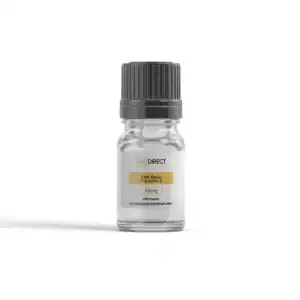 A copper peptide serum featuring GHK-Cu is often used in research to study its effects on skin texture, hydration, and overall skin appearance. Scientists study this serum to understand its role in wound healing and its ability to reduce visible signs of aging.
A copper peptide serum featuring GHK-Cu is often used in research to study its effects on skin texture, hydration, and overall skin appearance. Scientists study this serum to understand its role in wound healing and its ability to reduce visible signs of aging.
Researchers evaluate its effect on collagen production and its impact on a daily skincare routine.
Studies in research settings highlight its success in reducing fine lines and enhancing elasticity.
To know more about this, visit the GHK-Cu Basic Topical product page.
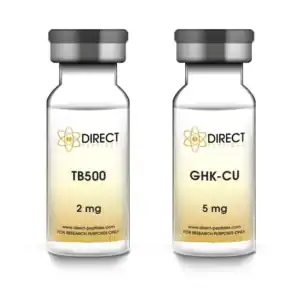 This combination is studied for its potential role in tissue repair and regeneration. TB500 is known for cellular repair and muscle recovery, making it valuable when paired with GHK-Cu.
This combination is studied for its potential role in tissue repair and regeneration. TB500 is known for cellular repair and muscle recovery, making it valuable when paired with GHK-Cu.
Researchers examine its effects on health problems linked to skin damage, inflammation, and overall skin renewal. Factors like water quality and farming practices in peptide sourcing are essential for maintaining consistent research outcomes.
To learn more about the stack’s benefits, check out the TB500 & GHK-Cu Stack product page.
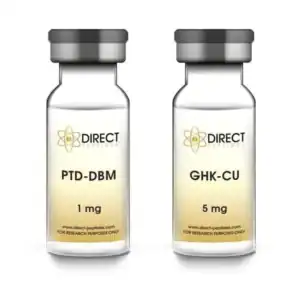 These peptides are being studied for their role in stimulating epidermal growth factor and improving overall skin health.
These peptides are being studied for their role in stimulating epidermal growth factor and improving overall skin health.
PTD-DBM is mainly known for stimulating hair follicle regeneration, but when combined with GHK-Cu, it may provide additional skin benefits.
Some studies focus on its anti-aging benefits, collagen synthesis, and its ability to address medical problems related to skin damage.
Researchers stress the importance of copper peptide content and actual product packaging integrity in ensuring efficacy.
For more details on this combination, visit the PTD-DBM & GHK-Cu product page.
Fact: Copper peptides help reduce visible signs of aging rather than accelerate them. When used in research at optimal concentrations, they promote collagen synthesis and skin firmness.
Fact: The copper content in research formulations is well within safe limits. Copper is a trace element required for normal biological functions, and its controlled use in peptide research shows promising results.
Fact: Studies indicates that vitamin C and copper peptides can complement each other. Vitamin C supports collagen production, while copper peptide aid in skin repair and elasticity.
Explore Peptide Supplies at Direct Peptides Estonia for all your reconstitution requirements.
Some studies show that subjects with sensitive skin may have mild reactions to copper peptides serum. These reactions include redness, irritation, or discomfort. In controlled settings, scientists observe these effects to understand how formulations interact with skin models. Since these peptides are for scientific purposes only and not for human use, testing follows strict guidelines and safety protocols.
A patch test is advised before extensive analysis. Applying a small amount to a test area helps assess reactions before broader application. This step confirms formulation suitability and ensures accuracy.
To maintain purity and consistency, artificial colors should not be in formulations. Keeping them free from unnecessary additives ensures reliable results and prevents contamination. Following testing standards is key to obtaining valid and repeatable outcomes.
Sustainability is a growing concern in peptide research. The inclusion of organic ingredients is essential. Adherence to organic standards also plays a key role. Avoiding synthetic fertilizers is necessary for ethical skincare research.
Peptides sourced with sustainability features are preferred in scientific studies. Those that are part of climate pledge initiatives gain more attention. The USDA organic seal is a key certification that minimizes the use of synthetic materials. It ensures high-quality and environmentally responsible sourcing.
Public input plays a vital role in peptide-based skincare research. It helps determine the direction of future studies. Researchers emphasize ethical sourcing. Avoiding synthetic materials is critical. Transparency in manufacturing is also necessary.
As research progresses, growth hormones and genetic engineering are being explored to enhance the efficiency of best copper peptide serum formulations. These innovations could pave the way for more effective skincare solutions.
Researchers are also analyzing their role in dietary supplements, nutritional supplements, and organic products to expand their applications beyond traditional skincare studies.
Copper peptides, particularly GHK-Cu, have demonstrated promising results in skincare research. Their ability to enhance collagen production, support wound healing, and protect against visible signs of aging makes them a valuable subject for further study. Myths exist, but scientific research supports their efficacy.
For those interested in copper peptide serum research, reputable suppliers like Direct Peptides offer a variety of options. Always ensure products meet high-quality standards and are strictly for research purposes—not for human use.
Ethical considerations, including sustainability features, organic material sourcing, and responsible farming practices, remain at the forefront of peptide research. Maintaining high standards and avoiding greasy residue allow researchers to explore the full potential of copper peptides in skin regeneration.
[1] Pickart L. The human tri-peptide GHK and tissue remodeling. J Biomater Sci Polym Ed. 2008;19(8):969-88.
[2] Pickart L, Margolina A. Regenerative and Protective Actions of the GHK-Cu Peptide in the Light of the New Gene Data. Int J Mol Sci. 2018 Jul 7;19(7):1987.
[3] Maquart FX, Pickart L, Laurent M, Gillery P, Monboisse JC, Borel JP. Stimulation of collagen synthesis in fibroblast cultures by the tripeptide-copper complex glycyl-L-histidyl-L-lysine-Cu2+. FEBS Lett. 1988 Oct 10;238(2):343-6.
[4] Hostynek JJ, Dreher F, Maibach HI. Human skin retention and penetration of a copper tripeptide in vitro as function of skin layer towards anti-inflammatory therapy. Inflamm Res. 2010 Nov;59(11):983-8.
[5] Dou Y, Lee A, Zhu L, Morton J, Ladiges W. The potential of GHK as an anti-aging peptide. Aging Pathobiol Ther. 2020 Mar 27;2(1):58-61.
Explore ALL Topical Peptides online today from Direct Peptides Estonia.
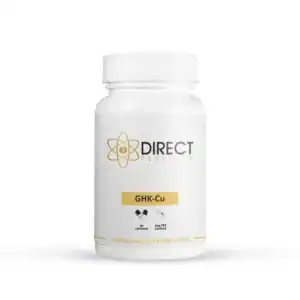
GHK-Cu Capsules
£63.33 Add to cart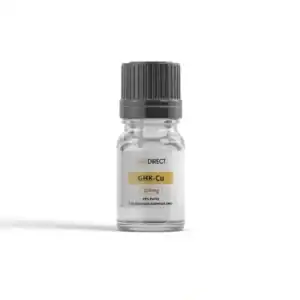
GHK-Cu (Topical)
£101.06 Add to cart
TB500 GHK-Cu Peptide Stack
£25.83 – £34.81Price range: £25.83 through £34.81 Select options This product has multiple variants. The options may be chosen on the product page
PTD-DBM GHK-Cu Peptide Stack
£30.50 – £39.48Price range: £30.50 through £39.48 Select options This product has multiple variants. The options may be chosen on the product pageALL CONTENT AND PRODUCT INFORMATION AVAILABLE ON THIS WEBSITE IS FOR EDUCATIONAL PURPOSES ONLY.
DISCLAIMER: These products are intended solely as a research chemical only. This classification allows for their use only for research development and laboratory studies. The information available on our Estonia Direct Peptides website: https://direct-peptides.com is provided for educational purposes only. These products are not for human or animal use or consumption in any manner. Handling of these products should be limited to suitably qualified professionals. They are not to be classified as a drug, food, cosmetic, or medicinal product and must not be mislabelled or used as such.